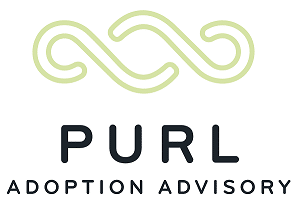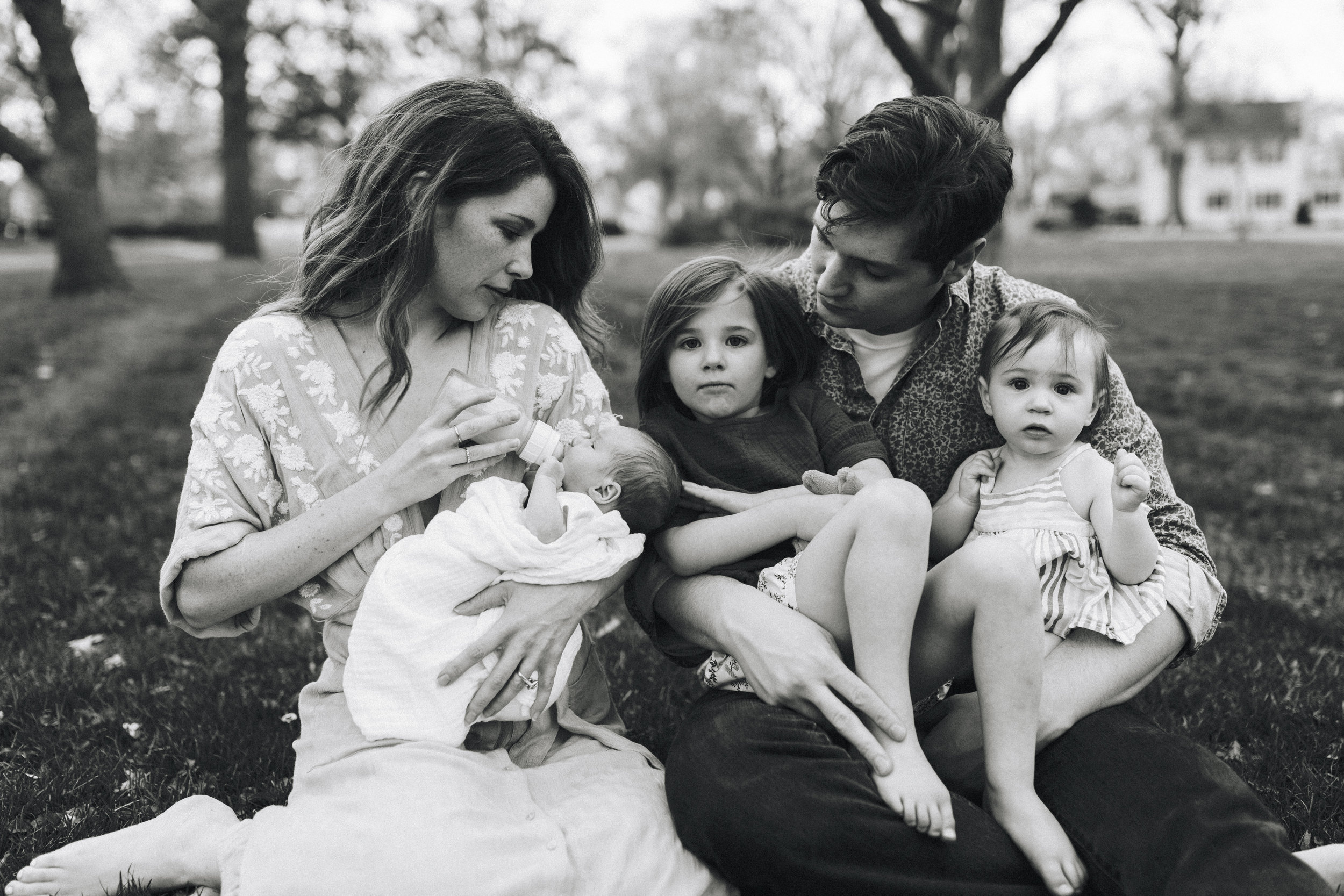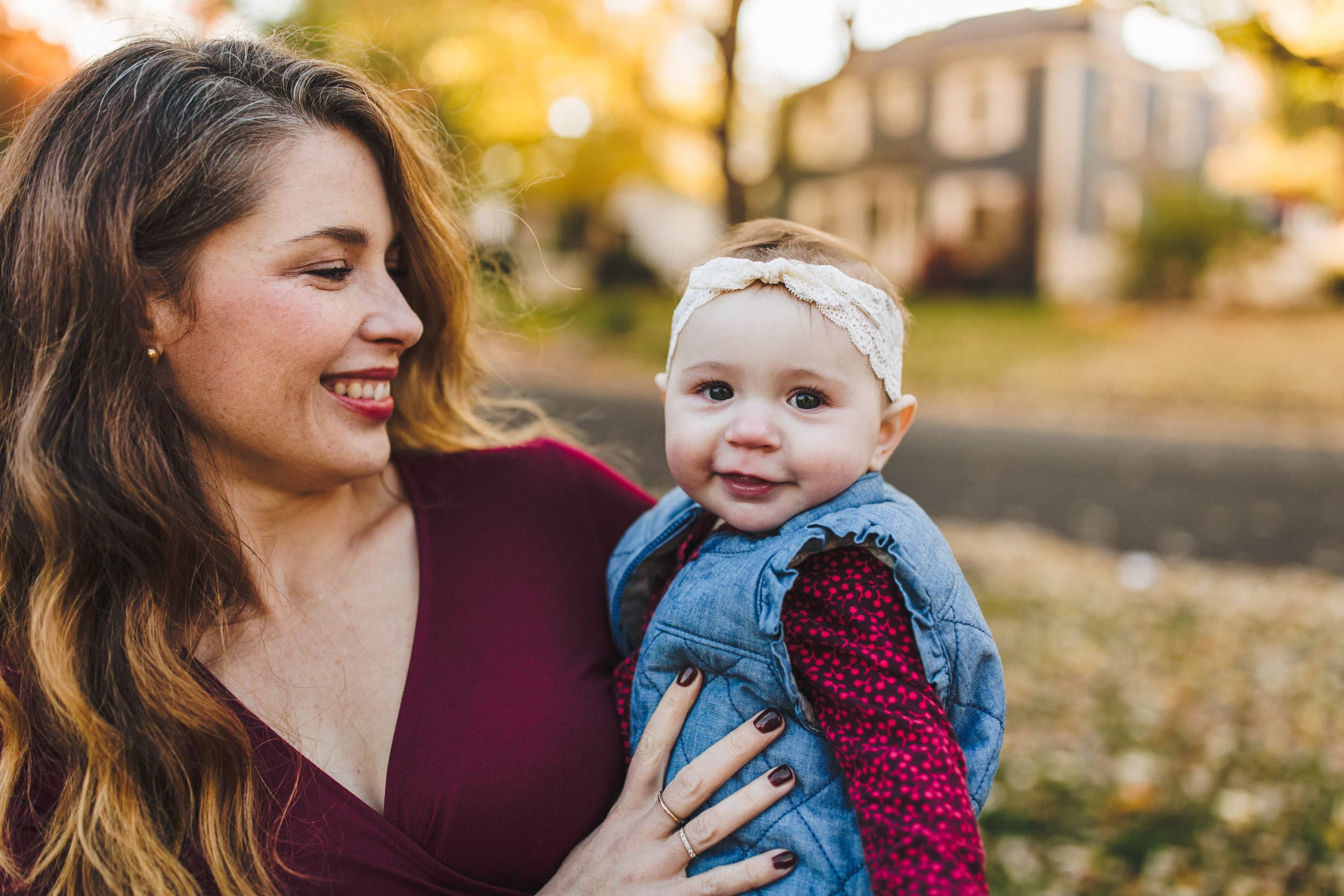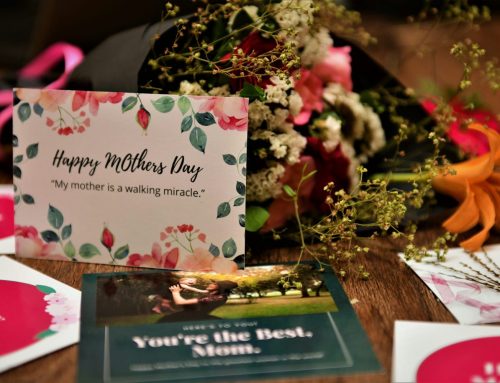By Ashley, mother to three incredible daughters adopted at birth and wife to Jason. She’s a middle school teacher, connoisseur of ice cream, lover of summer, and big proponent of sunscreen. She’s passionate about becoming an ever-evolving mother, wise to adoption-related issues and ethics–but mostly enveloping her girls in the love, care, and understanding they need. Ashley and her husband Jason are a former Purl family.
——-
I’m raising three girls–my daughters–whose identities will be different from mine in a fundamental way. They were all adopted at birth, and unlike me, are raised by parents and others in our village who do not share their biology. This isn’t a hard thing for me to wrap my mind around anymore and while it shifts my identity as a mother and distances me from the experiences of most mothers I know just a bit, my entire family has been built on love and choice and taking purposeful steps forward, not blood–which I appreciate and feel great pride in. More importantly, though, this adoptee identity is one my children will wrestle with, wrestling that I can’t do for them. Because I can only support and encourage and guide them in this understanding of their identities, my job in all of this is to learn as much as I can whenever and wherever I can so that they never fear what I will think or what I will feel. My children should rest easy in the fact that I love them, support them, and want them to be whomever they decide they are.
Honestly, I spend little time concentrating on the lack of biological link amongst my family. Goodness, my children could not be any more my children. But for them, adoption will likely occupy a bigger piece of their thinking and questioning, some of which will be difficult, especially as they grow and investigate and define their own identities. I have my biological connections in my mother and sister and various aunts and uncles. I don’t have to go too far to find my ancestry, family trees, lists of family names, and just where I might get my freckles and coarse hair. That encyclopedia of biological information is not so readily available for my children.
In my quest to be prepared for my children’s sake, in that quest to understand as much as possible and offer as much as possible as their mother, I read. I read and read. Will I be their best source for this investigation? Probably not. But through these efforts, I’ve learned how I can best relate, how I can offer empathy, how I can be emotionally prepared. Recently, I’ve read Far from the Tree by Andrew Solomon. It’s not a book about adoption. It’s a book about parents and children and identity. Here’s what I’ve learned:
I share with my parents my vertical identities: traits that I’ve inherited from my parents genetically and culturally and in terms of our family’s values. Some of these identities are significant: I am White, an English speaker who was raised Catholic; and some that are rather insignificant: my freckles come from my father, my height comes from my mother, and I’m not alone in my left-handedness. My children will possess some of the same vertical identities by virtue of being my children, but they are also adopted, and I am not. This identity my children will live as adoptees is considered a horizontal identity, an identity that is foreign to me as their parent but that will be fostered in a peer group of other adopted children, where they will likely gain significant community outside of me.
Solomon explores horizontal identity and the impact of raising children with whom you cannot entirely relate. To some extent, we are all raising children with horizontal identities, aren’t we? He writes, “In the subconscious fantasies that make conception look so alluring, it is often ourselves that we would like to see live forever, not someone with a personality of his own. Having anticipated the onward march of our selfish genes, many of us are unprepared for children who present unfamiliar needs” (1). After all, wouldn’t parenting be easier if we were simply parenting ourselves? Think of all the needs that we could anticipate and easily meet, all of the guessing and mistakes that would be eliminated.
The thing is, none of us are parenting ourselves. All of our children will ultimately have identities different from our own. Perhaps in ways that we resent, perhaps in ways of which we are proud. It’s the responsibility and challenge of using our imaginations as parents that really stretches us. It’s what’s hard but what also creates growth. Can we love someone who comes from our own bodies, our own genes, if they differ from us more than they are the same? Can we love someone who has no link to our bodies, no link to our genes, and still appreciate the traits they inherited from someone else? The answer is yes. The answer is absolutely. The question may even feel a bit offensive. But these things do challenge us as parents and remove us from those selfish fantasies we may have earlier relied upon. And it’s okay to acknowledge that. We should acknowledge that.
Solomon’s longitudinal research leads his readers through the common experiences of parents raising children from 10 different horizontal identities: deafness, dwarfism, Down Syndrome, autism, schizophrenia, general disability, prodigies, children who are products of rape, criminality, transgender, and homosexuality. There are countless other horizontal identities Solomon doesn’t explore in his book. Consider transracial families, biracial children being raised by parents who are not biracial, blindness, chronic illness, albinism, etc. Adoption.
As a gay man and father, Solomon in part sought, through his research, to explore his own childhood and the pain that came with it, especially due to his own horizontal identity. “I started this book to forgive my parents and ended it by becoming a parent,” he writes in his final chapter. “Understanding backward liberated me to live forward. I wanted to find out why I had experienced so much pain in my childhood, to understand what was my doing, what was my parents’, and what was the world’s. I felt I owed it to both my parents and myself to prove that we had been less than half the problem” (677).
The fascinating thing is–and it’s really kind of a lovely thing–parents of children with horizontal identities are living a common experience, a common parenthood in many ways. My children are adoptees, and as far as we can tell at their young ages, are developing according to a “normal” timeline. They have no identifiable disabilities, and we don’t yet know their sexual orientations or much about their mental health. That will all come in time. But my experience as their mother, the questions and fears I have for them as they explore the world and find their places in society with few links to their biology and many, many questions that I can’t answer, may not be all that different from the questions that consume the mother of a child who is transgender or has a hearing impairment. We are all hoping that our children with horizontal identities find community, knowing that we can’t be everything they need. We hope that they find love. That they are accepted by others. That they come to know and love themselves, including the parts of them that set them apart from the norm.
The gift in all of this as parents is the perspective we gain, the empathy we exercise, the community we find in other parents who are loving and nurturing and supporting children who have a fundamentally different life experience and identity than they do. We will make mistakes and question ourselves and sometimes feel alone in all of it. But we are all ultimately forced into a parenthood that transforms us (because none of us could have anticipated what parenthood really is), most likely for the better, even in spite of our failings. I hope my children forgive me for those failings and that I ensure they never doubt that it is my honor and privilege to love them. They make me better. They make all of us better.
By Ashley, mother to three incredible daughters adopted at birth and wife to Jason. She’s a middle school teacher, connoisseur of ice cream, lover of summer, and big proponent of sunscreen. She’s passionate about becoming an ever-evolving mother, wise to adoption-related issues and ethics–but mostly enveloping her girls in the love, care, and understanding they need. Ashley and her husband Jason are a former Purl family.
——-
I’m raising three girls–my daughters–whose identities will be different from mine in a fundamental way. They were all adopted at birth, and unlike me, are raised by parents and others in our village who do not share their biology. This isn’t a hard thing for me to wrap my mind around anymore and while it shifts my identity as a mother and distances me from the experiences of most mothers I know just a bit, my entire family has been built on love and choice and taking purposeful steps forward, not blood–which I appreciate and feel great pride in. More importantly, though, this adoptee identity is one my children will wrestle with, wrestling that I can’t do for them. Because I can only support and encourage and guide them in this understanding of their identities, my job in all of this is to learn as much as I can whenever and wherever I can so that they never fear what I will think or what I will feel. My children should rest easy in the fact that I love them, support them, and want them to be whomever they decide they are.
Honestly, I spend little time concentrating on the lack of biological link amongst my family. Goodness, my children could not be any more my children. But for them, adoption will likely occupy a bigger piece of their thinking and questioning, some of which will be difficult, especially as they grow and investigate and define their own identities. I have my biological connections in my mother and sister and various aunts and uncles. I don’t have to go too far to find my ancestry, family trees, lists of family names, and just where I might get my freckles and coarse hair. That encyclopedia of biological information is not so readily available for my children.
In my quest to be prepared for my children’s sake, in that quest to understand as much as possible and offer as much as possible as their mother, I read. I read and read. Will I be their best source for this investigation? Probably not. But through these efforts, I’ve learned how I can best relate, how I can offer empathy, how I can be emotionally prepared. Recently, I’ve read Far from the Tree by Andrew Solomon. It’s not a book about adoption. It’s a book about parents and children and identity. Here’s what I’ve learned:
I share with my parents my vertical identities: traits that I’ve inherited from my parents genetically and culturally and in terms of our family’s values. Some of these identities are significant: I am White, an English speaker who was raised Catholic; and some that are rather insignificant: my freckles come from my father, my height comes from my mother, and I’m not alone in my left-handedness. My children will possess some of the same vertical identities by virtue of being my children, but they are also adopted, and I am not. This identity my children will live as adoptees is considered a horizontal identity, an identity that is foreign to me as their parent but that will be fostered in a peer group of other adopted children, where they will likely gain significant community outside of me.
Solomon explores horizontal identity and the impact of raising children with whom you cannot entirely relate. To some extent, we are all raising children with horizontal identities, aren’t we? He writes, “In the subconscious fantasies that make conception look so alluring, it is often ourselves that we would like to see live forever, not someone with a personality of his own. Having anticipated the onward march of our selfish genes, many of us are unprepared for children who present unfamiliar needs” (1). After all, wouldn’t parenting be easier if we were simply parenting ourselves? Think of all the needs that we could anticipate and easily meet, all of the guessing and mistakes that would be eliminated.
The thing is, none of us are parenting ourselves. All of our children will ultimately have identities different from our own. Perhaps in ways that we resent, perhaps in ways of which we are proud. It’s the responsibility and challenge of using our imaginations as parents that really stretches us. It’s what’s hard but what also creates growth. Can we love someone who comes from our own bodies, our own genes, if they differ from us more than they are the same? Can we love someone who has no link to our bodies, no link to our genes, and still appreciate the traits they inherited from someone else? The answer is yes. The answer is absolutely. The question may even feel a bit offensive. But these things do challenge us as parents and remove us from those selfish fantasies we may have earlier relied upon. And it’s okay to acknowledge that. We should acknowledge that.
Solomon’s longitudinal research leads his readers through the common experiences of parents raising children from 10 different horizontal identities: deafness, dwarfism, Down Syndrome, autism, schizophrenia, general disability, prodigies, children who are products of rape, criminality, transgender, and homosexuality. There are countless other horizontal identities Solomon doesn’t explore in his book. Consider transracial families, biracial children being raised by parents who are not biracial, blindness, chronic illness, albinism, etc. Adoption.
As a gay man and father, Solomon in part sought, through his research, to explore his own childhood and the pain that came with it, especially due to his own horizontal identity. “I started this book to forgive my parents and ended it by becoming a parent,” he writes in his final chapter. “Understanding backward liberated me to live forward. I wanted to find out why I had experienced so much pain in my childhood, to understand what was my doing, what was my parents’, and what was the world’s. I felt I owed it to both my parents and myself to prove that we had been less than half the problem” (677).
The fascinating thing is–and it’s really kind of a lovely thing–parents of children with horizontal identities are living a common experience, a common parenthood in many ways. My children are adoptees, and as far as we can tell at their young ages, are developing according to a “normal” timeline. They have no identifiable disabilities, and we don’t yet know their sexual orientations or much about their mental health. That will all come in time. But my experience as their mother, the questions and fears I have for them as they explore the world and find their places in society with few links to their biology and many, many questions that I can’t answer, may not be all that different from the questions that consume the mother of a child who is transgender or has a hearing impairment. We are all hoping that our children with horizontal identities find community, knowing that we can’t be everything they need. We hope that they find love. That they are accepted by others. That they come to know and love themselves, including the parts of them that set them apart from the norm.
The gift in all of this as parents is the perspective we gain, the empathy we exercise, the community we find in other parents who are loving and nurturing and supporting children who have a fundamentally different life experience and identity than they do. We will make mistakes and question ourselves and sometimes feel alone in all of it. But we are all ultimately forced into a parenthood that transforms us (because none of us could have anticipated what parenthood really is), most likely for the better, even in spite of our failings. I hope my children forgive me for those failings and that I ensure they never doubt that it is my honor and privilege to love them. They make me better. They make all of us better.


 References
References

